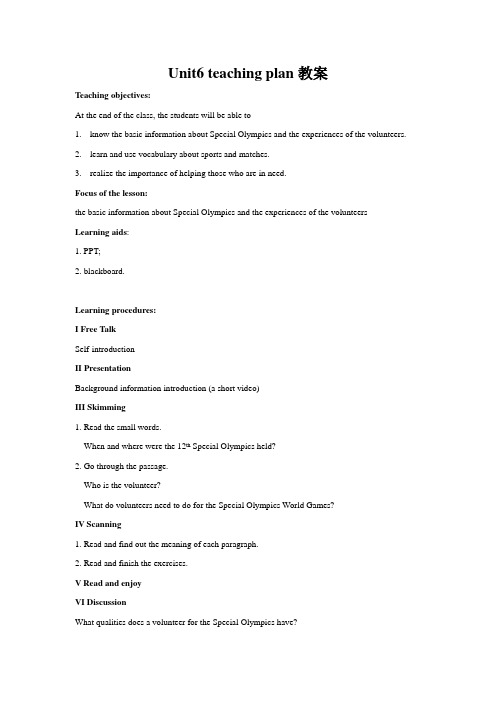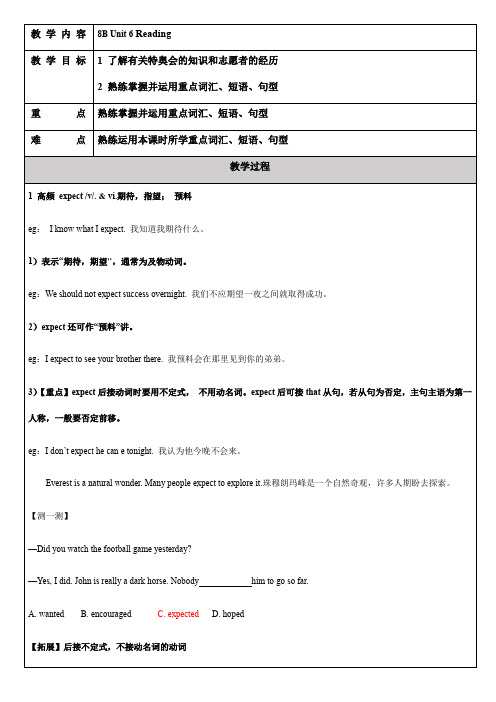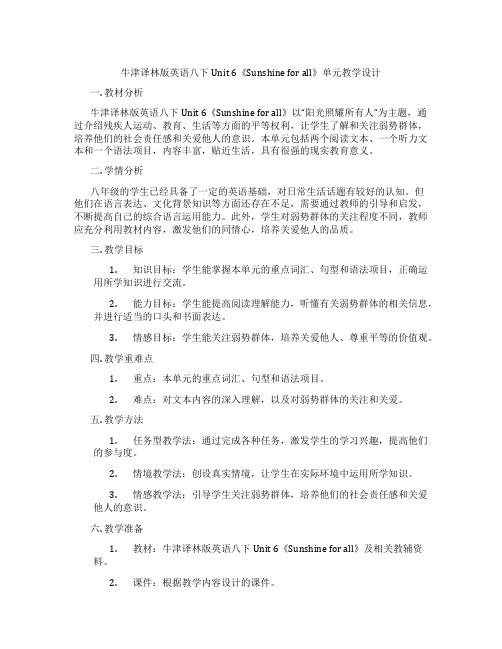【最新】牛津译林版八年级英语下册Unit6教案
【最新】牛津译林版八年级英语下册Unit6 teaching plan教案

Unit6 teaching plan教案Teaching objectives:At the end of the class, the students will be able to1.know the basic information about Special Olympics and the experiences of the volunteers.2.learn and use vocabulary about sports and matches.3.realize the importance of helping those who are in need.Focus of the lesson:the basic information about Special Olympics and the experiences of the volunteers Learning aids:1. PPT;2. blackboard.Learning procedures:I Free TalkSelf-introductionII PresentationBackground information introduction (a short video)III Skimming1. Read the small words.When and where were the 12th Special Olympics held?2. Go through the passage.Who is the volunteer?What do volunteers need to do for the Special Olympics World Games?IV Scanning1. Read and find out the meaning of each paragraph.2. Read and finish the exercises.V Read and enjoyVI DiscussionWhat qualities does a volunteer for the Special Olympics have?VII Follow upRead an advertisement about a volunteer project and make an introduction to the teachers. VIII Sum upHope every one’s life can be colorful, just like the rainbow drawn in the book.IX Homework1. Read and recite the passage.2. Finish exercises I, II and IV in the exercise book.。
最新牛津译林版中学八年级英语下册《Unit 6 Sunshine for all Reading 2》教案

Sunshine for all 教学目标知识目标 To understand the uses of the important phrases and sentences in the article;能力目标 1. To recite the passage.2. To get some further information about the article教学重点 The same as the aims教学难点 To skim the text for overall meanings and scan for details教 师 活 动 学生活动 备课札记Step 1 Revision 根据句意及首字母或中文提示填空。
Step 2 Presentation Retell the a rticle. Step 3 Language points 1. volunteer for the Special Olympics World Games 2. The Special Olympics World Games give children and adults with intellectual disabilities a chance to show their skills to the world. 特奥会给有智力缺陷的孩子和成人一个向全世界展示能力的机会。
3. They include many events similar to those in the Olympics, such as basketball, football and s wimm ing. 特奥会包括很多与奥运会类似的项目,如篮球、足球和游泳。
4. Over 40,000 people gave up their spare time for the 2007 Special Olympics World Games. 5. Then they provided support for the athletes and he lped make the event a great success. 然后志愿者们为运动员提供支持,使本届特奥会取得很大的成功。
【最新】牛津译林版八年级英语下册Unit 6 Task 教案

Unit 6 Sunshine for all教案TaskI. Teaching aims and learning objectivesBy the end of the lesson, students should be able to:1. organize the ideas before writing;2. write a letter to ask for help.II. Teaching contents1. New words and phrases: introduction, disease, operation, survivor, give a helping hand2. New structures: … need our help.It’s important/dangerous/… for … to …If all of us can give a helping hand, … may …Thank you for your help/support.III. Focus of the lesson and predicted area of difficultyTo d evelop the students’ writing ability.IV. Teaching proceduresStep 1 Lead-in1. Show the learning aimsT: Today we will learn Task. Let’s have a look at the learning aims.2. Look and discussT: There are many people who need our help around us. Look at the pictures and discuss: Who needs help? What kind of help do they need? How can we help?T: When someone is in trouble, we should give him/her a helping hand. We can write a letter asking for more people’s help.【设计意图:通过看图讨论,创设情境,导入新课。
最新牛津译林初中八年级英语下册 Unit 6 Sunshine for all Task教案

Unit 6教学目标To know how to write a letter asking for help.教学重点To write a letter asking for help.教学难点To write a letter asking for help.教学过程集体备课备课札记Step 1 RevisionWe’ve learnt about groups of people who need our help inthis unit. Get the students to tell us who the se peopleare and how we can help them?Step 2 Warming upGet the students tell: other people who need our help.Then present some new words: survivor, disease,operation.Step 3 Writing1. Get the s tudents to answer the questions:What are the main parts of an article?How can we organize our ideas before writing?2. Peter wants to write a letter to ask for help. PresentPeter’s ideas of his letter.Introduction Who needs help?Main body Information abou t the person orgroup in needWhat kind of help do they need?How can we help?Conclusion Thanks for helpStep 4 Language points1. He has been ill in hospital since last month.他从上个月开始生病住院了。
最新牛津译林版中学八年级英语下册 Unit 6 Sunshine for all Welcome to the unit教案

Comic strips & welcome to the unitTeaching contents: Welcome to the unit and Comic stripTeaching aims:1. Learn some words about vulnerable groups.2. Learn to talk about how to help vulnerable groups.3. Foster a sense of helpful.Important points:Vocabulary: train the Olympic Games supportBlind deaf elderlyPhrase: need some more food a disabled/blind/homeless personan elderly person deaf peopleSentence: It’s meaningful to do something for the Olympic Games.I need some more food to eat at work.Homeless people don’t have their own places to live.They can provide special places for homeless people to stay.Procedures:Activity one: Welcome to the unitStep 1: Free talkT: Do you know what this project is?S: It’s Project Hope.T: Who does this project help?S: It helps….T: How can we help them?S: ….Step 2: Learn some words about people in need.1.Look at this picture, what’s wrong with the person in the picture? ( disabled, blind,elderly…)2.Read the words and complete Part A.Step 3: Discuss how to help some people me ntioned in Part A.1.Listen to Amy and Daniel’s conversation and answer the questions.What are homeless people?How can we help them?Do you know any other ways to help them?2.Work in pairs and make a dialogue.3.Discussion: What other vulnerable people should we pay pity on?Activity two: Comic stripStep 1: New words1. Do you think it’s meaningful to help others?2. If you help others, I will support you.3. We all want to be volunteers.Step 2: Look, listen and answer.1.What is Hobo doing?2.Will Eddie support Hobo? How will he support Hobo?3.What does Hobo need Eddie to do for him?Step 3: Try to retel l the story.Hobo is exercising at home. Eddie asks w he is doing. Hobo says that he ist to be a volunteer for the Olympic Games. Eddie thinks it is m to workfor the Olympic Games, and he wants to do something as w . He takes out his w and gives some money to Hobo. H , Hobo says he doesn’t want any money. He pointsto a big bag full of f an d asks Eddie to c it for him so that he can eatmore while w . Eddie is strong e to do that, isn’t he?Activity three: Learn some important points.Activity four: Exercise.Exercise一、根据句意、首字母或汉语提示完成句子1. It’s polite to giv e seats to the e on a bus.2. The next (奥运会)will be held in Brazil.3. The man is b in his right eye, but his left eye is good.4. I wanted to join the school football team, but my parents didn’t s me.5. The young men are t as police officers.二、单项选择1. is difficult for a two-year-old child to dress himself.A. ThatB. ThisC. ItD. Three2. That basketball player is a man. He can’t hear anything.A. blindB. goodC. deafD. homeless3. Two years ago, I trained a teacher.A. to doB. to beC. doingD. being4. ----What is the of the sign on the wall?----It “ Be quiet ”.A. means; meaningB. meaningful; meaningC. meaning; meansD. means; mean5. There are not enough chairs for all the teachers. I think we need .A. other twoB. only twoC. two moreD. two otherAnswers: 一、1.elderly 2. Olympic Games 3. blind 4. support 5. trained二、1. C 2. C 3. B 4. go 5. CTeaching reflection:。
牛津译林版八年级英语下册Unit6Grammar教学设计

3.对本节课的重点和难点进行梳理,强调动词过去式的变化规则。
4.鼓励学生在课后继续练习,加强对语法知识的巩固。
5.布置课后作业,要求学生在作业中运用一般过去时和频率副词,提高语法应用能力。
五、作业布置
为了巩固本节课所学的一般过去时和频率副词的知识,以及动词过去式的变化规则,特布置以下作业:
4.语法填空:完成一份包含一般过去时和频率副词的语法填空练习,共10题。
5.家庭作业:要求家长参与,学生向家长用英语讲述一个自己童年时的趣事,家长记录孩子所用的句子,并关注一般过去时和频率副词的使用情况。
6.视频观看:推荐观看一部英文电影或纪录片,让学生在观看过程中注意一般过去时和频率副词的用法,并在观看后进行总结。
-利用信息技术,如多媒体、网络资源等,为学生提供丰富的学习材料和互动平台,提高学习兴趣和效率。
-实施个性化教学,关注学生的差异,提供不同层次的学习支持,确保每个学生都能在原有基础上得到提高。
3.教学评价:
-结合形成性评价和终结性评价,全面评估学生的学习过程和结果。
-采用自我评价、同伴评价、教师评价等多种评价方式,鼓励学生主动参与、自我反思。
3.要求学生在规定时间内,用英语讨论并回答问题。
4.鼓励学生相互提问、补充,提高讨论的深度和广度。
5.每个小组汇报讨论成果,其他小组进行评价和反馈。
(四)课堂练习
在本环节中,我将设计多种形式的练习题,帮助学生巩固所学知识。
1.填空题:设计一般过去时和频率副词的填空题,让学生在规定时间内完成。
2.改错题:提供包含错误的一般过去时句子,让学生找出错误并改正。
2.难点:
-学生对于一般过去时的运用不够熟练,容易与其他时态混淆。
Unit6reading教案牛津译林版英语八年级下册

Period 21. achieve2. prize3.gold4. necessary5.coach二、6. to e 7 smoking 8. to finish 9. walking 10.closely三、11.C点拨: subject mistake错误;chance space空间。
由句意可知是“和外国人练习英语的机会”,故选C12.D点拨:本题用推理判断法。
根据后半句“因为他不够有活力”,可推知贝克汉姆决定放弃踢足球。
put off推迟;deal with处理;break off give up放弃。
故选D13.B点拨:different similar意为“类似的”,strange意为“奇怪的”,interesting意为“有趣的”。
根据语境,答句句意为:不同?哦,不。
它们看起来非常相似。
故选B。
14.A点拨:句意:莱昂纳多·迪卡普里奥是位著名的美国演员,总是期待着赢得奥斯卡奖,最终他成功了。
《cxpcctod6《sth.意为“期待做某事”,其否定形式为expect not to do sth.结合句意可知,此处应该用肯定形式。
15.A点拨:本题用结构分析法。
It's+形容词+of sb. to do sth.意为“某人做某事是……的”。
join指加入某种组织并成为其中一员,join in指参加某项活动等,故选A。
四、16. take part in17 is similar to18.patient:give19.for;well20. helped make;a great success。
牛津译林版英语八下Unit 6《Sunshine for all》单元教学设计

牛津译林版英语八下Unit 6《Sunshine for all》单元教学设计一. 教材分析牛津译林版英语八下Unit 6《Sunshine for all》以“阳光照耀所有人”为主题,通过介绍残疾人运动、教育、生活等方面的平等权利,让学生了解和关注弱势群体,培养他们的社会责任感和关爱他人的意识。
本单元包括两个阅读文本、一个听力文本和一个语法项目,内容丰富,贴近生活,具有很强的现实教育意义。
二. 学情分析八年级的学生已经具备了一定的英语基础,对日常生活话题有较好的认知。
但他们在语言表达、文化背景知识等方面还存在不足,需要通过教师的引导和启发,不断提高自己的综合语言运用能力。
此外,学生对弱势群体的关注程度不同,教师应充分利用教材内容,激发他们的同情心,培养关爱他人的品质。
三. 教学目标1.知识目标:学生能掌握本单元的重点词汇、句型和语法项目,正确运用所学知识进行交流。
2.能力目标:学生能提高阅读理解能力,听懂有关弱势群体的相关信息,并进行适当的口头和书面表达。
3.情感目标:学生能关注弱势群体,培养关爱他人、尊重平等的价值观。
四. 教学重难点1.重点:本单元的重点词汇、句型和语法项目。
2.难点:对文本内容的深入理解,以及对弱势群体的关注和关爱。
五. 教学方法1.任务型教学法:通过完成各种任务,激发学生的学习兴趣,提高他们的参与度。
2.情境教学法:创设真实情境,让学生在实际环境中运用所学知识。
3.情感教学法:引导学生关注弱势群体,培养他们的社会责任感和关爱他人的意识。
六. 教学准备1.教材:牛津译林版英语八下Unit 6《Sunshine for all》及相关教辅资料。
2.课件:根据教学内容设计的课件。
3.教学资源:有关弱势群体的图片、视频等。
七. 教学过程1.导入(5分钟)利用图片或视频引入弱势群体的话题,激发学生的兴趣,引导学生思考和讨论。
2.呈现(10分钟)呈现本节课的主题,让学生明确学习目标。
- 1、下载文档前请自行甄别文档内容的完整性,平台不提供额外的编辑、内容补充、找答案等附加服务。
- 2、"仅部分预览"的文档,不可在线预览部分如存在完整性等问题,可反馈申请退款(可完整预览的文档不适用该条件!)。
- 3、如文档侵犯您的权益,请联系客服反馈,我们会尽快为您处理(人工客服工作时间:9:00-18:30)。
Unit6 Reading 2 教案
Teaching aims:
By the end of this lesson, the students are expected to be able to:
1. have a deep understanding of the Special Olympics World Games
2. use the key words and phrases learnt in this class correctly
3. willing to help the people in need.
Teaching procedures:
Step 1 Lead-in
Start the topic by showing some pictures about the Special Olympics World Games Step 2 Revision
Ask students some basic information about the event (where, when, who).
Step 3 Presentation
1. Focus on the different use of “volunteer”
work as a volunteer
volunteer for…/ to do
2.Talk about Liu Ming’s feelings.
Focus on the use of “expect”: expect …/to do
3.Talk about the Special Olympic World Games.
Focus on the use of “similar to”
4.Talk about volunteers’ work.
Focus on the use of some words and phrases
give up: give up sth, give up doing sth, give…up
train& training
Ask students to discuss “How to be a good volunteer for the Special Olympics?”
5. Ask some questions and present new phrases and use them to complete a diary.
( swimming coach, be born with, not..but, finish fourth…)
6. Talk about the influence of the Special Olympics World Games.
Focus on the use of “closely”
Step 4 Consolidation
Ask students to use what they learned to fill in the blanks about Youth Olympics Step 5 Conclusion
Ask students to discuss “How to help people in our daily lives?”
End the class with a poem.
Step 6 Homework
1. Use the Internet to learn more about Special Olympics World Games.
2. V olunteer to do something for people in need around you.。
